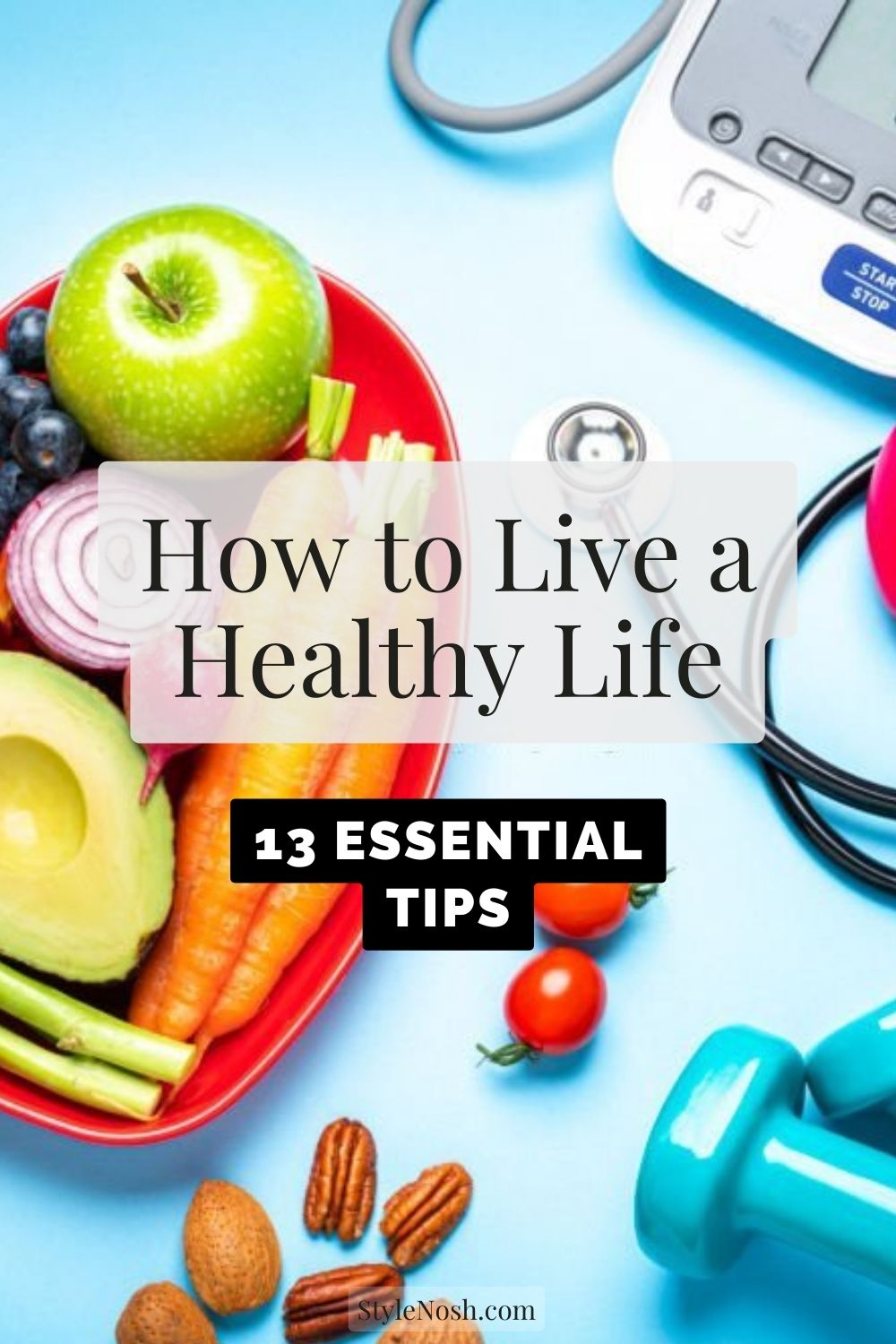Ask yourself: Do you eat well? What is your regularity with working out? Do you make it a habit to consume eight or more glasses of water daily? How much sleep do you get each night? How healthy of a lifestyle do you maintain?
Take good care of yourself!! You may take action right away to improve your health and feel fantastic, regardless of your age. Even simple adjustments can have a significant impact on how you feel.
Feeling cold? See also: 43 Cozy Sweaters For Fall That Will Ease You Into The New Season
Healthy living, a positive attitude, and a positive self-image are all healthy components of good health. It’s not only about exercising and eating well. I have gathered the 13 most important tips to live a healthy life for every man and woman. Save this article and its advice for later reference; you’ll need it to lead a healthier life.
#1 Increase your water intake
The majority of us don’t regularly drink enough water. Did you realize that water makes up more than 60% of our body weight? As it has no calories, sugar, or additives, drinking water is the best way to stay hydrated.
Drinking a full glass of water first thing in the morning is a great way to kick off the day and get your body ready to go. Drinking water early thing in the morning can help with digestion, and skin health, and boost energy.
New research suggests that if you cut back on portions and drink two 8-ounce glasses of water before each meal, you can lose weight and keep it off for at least a year.

#2 Get enough sleep
Adults often require between 7 and 9 hours of sleep per night. Quality sleep is just as important as quantity, though.
Lack of quality sleep is the main cause of excessive weight and obesity. You will consume more than you need if you don’t get enough sleep. As a rule, it consists of processed junk food. Your ability to function physically and mentally is negatively impacted by lack of sleep, which also affects the hormones that control eating. Another negative consequence of not getting enough sleep is premature aging.

#3 Exercise regularly
According to research, regular exercise has a huge positive impact on our health, extending our life expectancy, reducing our risk of disease, increasing bone density, and helping us lose weight.
According to a National Institutes of Health study, aerobic exercise reduces the signs and symptoms of depression and anxiety. Exercises that are aerobic include jogging, swimming, cycling, walking, gardening dancing.

#4 Enjoy a nutritious diet
It is estimated that we require more than 40 distinct nutrients for optimal health, and there is no single diet that can provide all of these. A balanced diet over time will make a difference, not just one particular meal.
Processed foods, fast food, and sweets are all examples of less nourishing diets that can be detrimental to mental health. A balanced and diverse diet includes nuts, seeds, beans, lentils, fruits, lean meats, fish, veggies, and bread and cereals—mostly whole grain.
Having a diet that is high in nutrients might reduce your mood and give you more energy. Omega-3 fatty acids from fish and Omega-6 fatty acids from seeds and nuts both increase brain function and reduce aggravation, according to scientific research.

#5 Consume fruits & vegetables
As part of a balanced diet, foods high in potassium, such as vegetables and fruits, may help reduce blood pressure, kidney stone risk, and bone loss.
Vitamins and minerals can be found in abundance in fruits. Have you heard that the vitamin C in oranges is more potent than in vitamin C pills? Take in your vitamins and minerals from food sources instead of tablets whenever possible. Try to start your day with a healthy serving of fruit.
Satisfy your palate with these nutritious fruits: Banana, Papaya, Kiwi, Strawberries, Blueberries, Blackberries, Raspberries, Watermelon, Rockmelon, Honeydew, Peach, Apple, Grapefruit, Pomelo, Mango, and Orange.
Folate, vitamin K, folate, vitamin A, manganese, and potassium, not to mention dietary fiber, are just some of the nutrients and minerals that can be found in vegetables.
Vegetables can be classified as either “starchy,” such as potatoes, sweet potatoes, yams, and pumpkins, or “non-starchy,” such as kale, arugula, spinach, broccoli, brussels sprouts, long beans, tomato, cucumber, and mushroom (technically a fungus).

#6 Reduce your intake of salt and sugar
High blood pressure and an elevated risk of cardiovascular disease can both be brought on by a high salt intake. There are several strategies to reduce the amount of salt in the diet including:
- The salt amount in our diets could be reduced by selecting lower-sodium options at the grocery store.
- It’s preferable to eat without salt, or at least wait to apply it after each bite, rather than at the table.
- Spices can be used in place of salt when cooking to increase flavor variation.
Sugar gives foods and drinks sweetness and an alluring flavor, but because they are high in energy, it is best to consume them in moderation and only occasionally as a pleasure. Fruits are a better alternative, and they can even be used to sweeten food and beverages.

#7 Have a healthy protein intake
In order for your body to produce new cells and tissues, you must consume enough protein, which is essential for good health.
A high protein diet can increase your metabolic rate, or how many calories you burn, while also making you feel full. Additionally, it might reduce your appetite for late-night snacks and cravings.

#8 Meditate (Yoga)
Your health suffers when you are under stress. It has a wide range of effects on things like blood sugar, diet, illness risk, overall weight composition, and more. Therefore, it’s crucial to learn effective stress management techniques.
One such technique is meditation, which has some scientific support for its effectiveness in stress management and health improvement.
Researchers showed that meditation reduced LDL (bad) cholesterol and inflammation compared to the control group in a trial involving 48 individuals with high blood pressure, type 2 diabetes, or both. Aside from that, those who took part in the meditation class reported feeling better both physically and mentally.

#9 Learn to love yourself
In order to lead a healthy life, self-love is essential. Your mental outlook and physical health inevitably suffer when you have a bad self-image. A healthy life includes having a good sense of mental wellness. People who are harmful shouldn’t be in your life. Allow a friend to go if you believe they are being unreasonably critical or negative.
How much, on a scale of 1 to 10, do you love yourself? Why? How can you start loving yourself more today?

#10 Deep Breathing
Life is dependent on oxygen! Although you may be able to breathe, are you breathing correctly? Most people don’t breathe properly; they only use around one-third of their lung capacity and take short breaths. To achieve their optimum performance, athletes are taught optimal breathing techniques.
A full breath causes your lungs to fill completely, your abdomen to expand, and your shoulders to move the least amount possible.

#11 Use plenty of spices and herbs
These days, we have a wider selection of herbs and spices than ever before. They may also have a number of health advantages in addition to adding flavor. For instance, both ginger and turmeric have strong anti-inflammatory and antioxidant properties that may improve your overall health.
You should try to include a wide variety of herbs and spices in your diet due to their significant potential health advantages.

#12 Do things you enjoy
Doing activities you enjoy every day is something that is frequently forgotten as an important component of the good life. Set aside time each day to indulge in hobbies that you individually enjoy, whether it be exercise, baking, creating, reading a book, or watching TV.

#13 Stop smoking
The percentage of smokers who simultaneously have a mental disease is around 50%. There is evidence that smoking’s toxins cause mood disorders. In addition, smoking’s negative effects on physical health and significantly raises the chance of heart attack, lung cancer, kidney cancer, esophageal cancer (of the gullet), and other diseases.
In addition, smoking’s negative effects on physical health and significantly raises the chance of heart attack, lung cancer, kidney cancer, esophageal cancer (of the gullet), and other diseases.
Stopping smoking can be extremely difficult and may result in a brief loss of mental health. Remember that quitting has numerous advantages for mental health, and you can start experiencing these advantages within just a few weeks.




